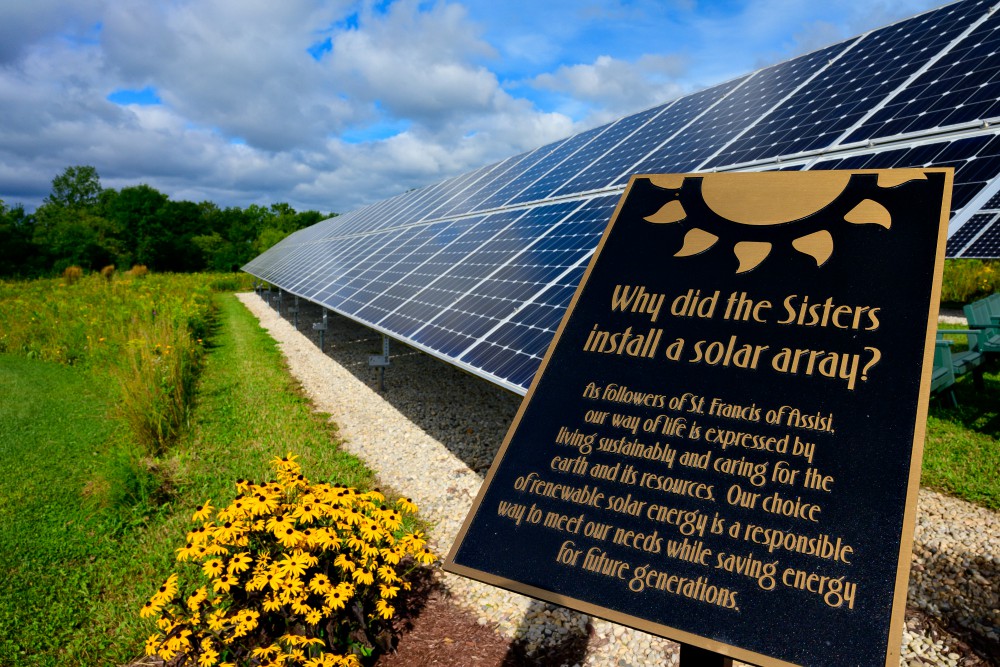
In addition to installing 280 new solar panels, the Sisters of St. Francis of the Holy Cross in Green Bay, Wisconsin, offer an educational path with seven plaques explaining solar energy. (CNS/The Compass/Sam Lucero)
Prepare to be depressed. In the New Yorker, Jonathan Franzen explains that we are probably past the point at which we could prevent the climate change apocalypse. At least Franzen has the decency to alert us at the beginning of his essay, by starting with a quote from Kafka. Whether the situation is as dire as many scientists think, it is certainly the height of irresponsibility not to do everything we, as a nation, as a species, can do to avert or at least minimize the effects of the crisis.
At Politico, Republicans are nervous that 2020 may be for the Democrats what 2010 was for the Republicans, a year in which gains in state legislatures allow the party to rewrite congressional districts for a decade. Even if the Democrats do not win control of both houses of a particular state legislature, denying such control to the GOP will result in a more level playing field.
So, South Bend Mayor Pete Buttigieg thinks the American voters are like Charlie Brown playing football with Lucy. Explaining he took a different approach to issues from his competitors, he told Stephen Colbert: "It's why I'm not making the same promises that some of the candidates to my left are. I share the goals and believe that we can do it in a way that will bring Americans together."
The canard about bringing Americans together died when Mitch McConnell became majority leader and, truth be told, it was pretty much half-dead before that. Buttigieg talks like a business consultant, which makes sense seeing as he did a stint at McKinsey. But, in last week's CNN town hall on climate change, he was asked if his city had a climate change strategy and guess what? They don't, so he dodged the question. He is well-spoken, to be sure, but there is not as much there as he wants us to think.
In The Washington Post, Jennifer Rubin confronts the "electability" issue that continues to prop up former Vice President Joe Biden's campaign and hobbles that of Sen. Elizabeth Warren. The money graph:
I'll hazard a guess that early media coverage was based on the expectation she'd be regarded as too closely resembling Hillary Clinton — over-prepared, lots of plans, liberal, white, blond. Yes, those superficial characteristics were enough to convince some in the punditocracy that she'd be Hillary 2.0. When Warren began to campaign, and voters heard her overall vision (government is working only for the super-rich and super-powerful) and her personal story weaving in anecdotes that ordinary voters can relate to, voters figured out she wasn't Clinton at all.
This pundit knew all along Warren was vastly different from Clinton. What I did not know is that Warren would be so good at retail politics.
At Religion News Service, Mark Silk argues that Pope Francis, leaning on Bonaventure, takes a different approach to creation from that of his predecessors, even though they also highlighted the need to care for the environment. I would be careful not to overstate the case: Francis knows that creation is stained by sin, too. But the differences of inflection are not only present, they are, as Silk points out, able to forge a point of contact with non-Catholics who care for the environment.
Also at RNS, Charles Camosy on why the mainstream media does not "get" religion. Secularism, it turns out, requires no hostility, just the kind of blind spots that are uniquely found among the kind of white, highly educated, affluent people who are mostly likely to work at a mainstream media outlet. Note to all political operatives: Get out of your Twitterverse to make sure you understand that many millions of Americans really do structure their view of the world through a theological lens.
File this under "Long arc of the Reformation": A Presbyterian church in New York has managed to incarnate Richard Dworkin's "religion without God." It is not surprising that The New York Times views the phenomenon with amusement or even with mild approval rather than shock. The story put me in mind of Dr. Johnson's tour of Scotland and its many ruined abbeys and churches. Boswell asked where John Knox was buried and Johnson replied: "I hope in the high-way. I have been looking at his reformations."
Also at the Times, Matti Friedman on the unspoken backdrop of Israeli elections: the experience of the suicide bombings in the late '90s and most of the aughts, rarely discussed but now the subject of a film. Israeli Prime Minister Bibi Netanyahu is still running as the guy who made Israel safe again and it just might work again.
Advertisement
[Michael Sean Winters covers the nexus of religion and politics for NCR.]
Editor's note: Don't miss out on Michael Sean Winters' latest. Sign up and we'll let you know when he publishes new Distinctly Catholic columns.







